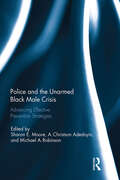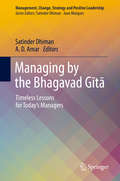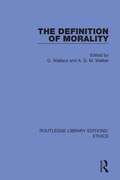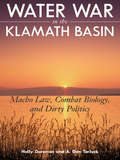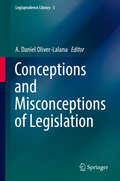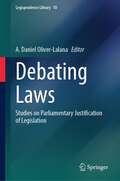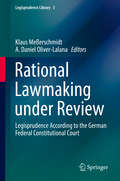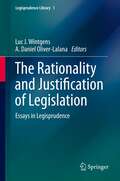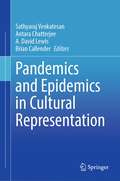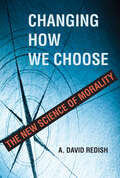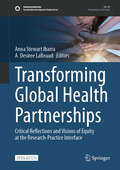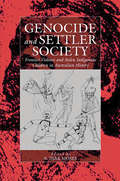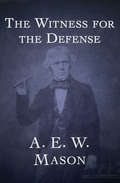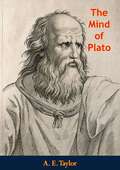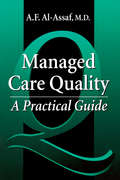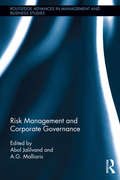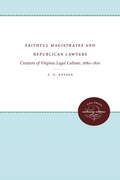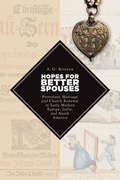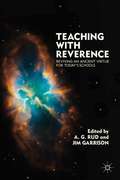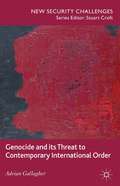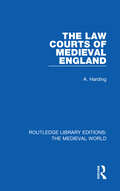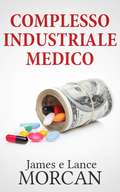- Table View
- List View
Police and the Unarmed Black Male Crisis: Advancing Effective Prevention Strategies
by Michael A. Robinson Sharon E. Moore A. Christson AdedoyinPresenting both historical and contemporary discussions and coverage, this book provides an in-depth and critical analysis of police brutality and the killing of unarmed black males in the United States of America. Within the book, contributors cover five key areas: the historical context and contemporary evidence of police brutality of unarmed black people in the USA; the impact of police aggression on blacks’ well-being; novel strategies for prevention and intervention; the advancement of a cordial relationship between police and black communities; and how best to equip the next generation of scholars and professionals. Each contributor provides a simple-to-understand, thought-provoking, and creative recommendation to address the perennial social ill of police brutality of black males, making this book an excellent resource for students, scholars and professionals across disciplinary spectrums. This book was originally published as a special issue of the Journal of Human Behavior in the Social Environment.
Private Power and Global Authority: Transnational Merchant Law in the Global Political Economy
by A. Claire CutlerTransnational merchant law, which is mistakenly regarded in purely technical and apolitical terms, is a central mediator of domestic and global political/legal orders. By engaging with literature in international law, international relations and international political economy, the author develops the conceptual and theoretical foundations for analyzing the political significance of international economic law. In doing so, she illustrates the private nature of the interests that this evolving legal order has served over time. The book makes a sustained and comprehensive analysis of transnational merchant law and offers a radical critique of global capitalism.
Managing by the Bhagavad Gītā: Timeless Lessons for Today’s Managers (Management, Change, Strategy and Positive Leadership)
by Satinder Dhiman A. D. AmarDrawing upon the timeless wisdom of the Bhagavad Gītā, a philosophical-spiritual world classic, this professional book highlights the spiritual and moral dimensions of management using an inside-out leadership development approach. It interprets the Bhagavad Gītā’s teachings on the personality types and psychological makeup of managers and employees; self-knowledge and self-mastery; and the leadership concepts of vision, motivation, and empowerment. This book covers topics such as training of the mind, ethical leadership, communication, stress management, and corporate social responsibility (CSR). Collectively, the enclosed contributions provide managers with an enhanced outlook on management functions such as leading, planning, organizing, and controlling in today’s organizations, particularly those run by knowledge workers. Management research in the 20th century has mainly focused on the industrial paradigm characterized by a hierarchical structure of authority and responsibility with an individualistic focus on the personality of the manager. However, this traditional paradigm cannot solve many of the problems that confront leaders and mangers today. Recent studies have shown that values traditionally associated with spirituality—such as integrity, honesty, trust, kindness, caring, fairness, and humility—have a demonstrable effect on managerial effectiveness and success. Although traditionally interpreted as a religious-spiritual text, the Bhagavad Gītā teaches these values which can be extrapolated and applied to practical management lessons in today’s corporate boardrooms. Applying the text of the Bhagavad Gītā to the context of management, this book views the manager as an “enlightened sage” who operates from higher stance, guided by self-knowledge and self-mastery. It demonstrates how character is the key ingredient for effective management and leadership. This book is therefore applicable to all managers, from first-line to CEOs, in their management and leadership roles in organizations.
The Definition of Morality
by G. Wallace A. D. M. WalkerOriginally published in 1970, the papers in this volume discuss the essential and defining characteristics of morality and moral issues and examine how moral views differ from political views, moral beliefs from religious beliefs, and moral judgements from aesthetic judgements. Some of the chapters discuss problems of method and shed light on the complex conditions which any successful definition of morality must satisfy. Taken collectively, these papers reflect he wide variety of approaches adopted by contemporary philosophers.
Water War in the Klamath Basin: Macho Law, Combat Biology, and Dirty Politics
by A. Dan Tarlock Holly D. DoremusIn the drought summer of 2001, a simmering conflict between agricultural and environmental interests in southern Oregon's Upper Klamath Basin turned into a guerrilla war of protests, vandalism, and apocalyptic rhetoric when the federal Bureau of Reclamation shut down the headgates of the Klamath Project to conserve water needed by endangered species. This was the first time in U.S. history that the headgates of a federal irrigation project were closed--and irrigators denied the use of their state water rights--in favor of conservation. Farmers mounted a brief rebellion to keep the water flowing, but ultimately conceded defeat. In Water War in the Klamath Basin, legal scholars Holly Doremus and A. Dan Tarlock examine the genesis of the crisis and its fallout, offering a comprehensive review of the event, the history leading up to it, and the lessons it holds for anyone seeking to understand conflicts over water use in the arid West. The authors focus primarily on the legal institutions that contributed to the conflict--what they call "the accretion of unintegrated resource management and environmental laws" that make environmental protection so challenging, especially in politically divided regions with a long-standing history of entitlement-based resource allocation. Water War in the Klamath Basin explores common elements fundamental to natural resource conflicts that must be overcome if conflicts are to be resolved. It is a fascinating look at a topic of importance for anyone concerned with the management, use, and conservation of increasingly limited natural resources.
Conceptions and Misconceptions of Legislation (Legisprudence Library #5)
by A. Daniel Oliver-LalanaThis volume brings together an international group of legal scholars to discuss different approaches to lawmaking. As well as reflecting the diversity of legisprudence as a re-emerging academic field, it offers a broad overview of current developments and challenges in the theory of legislation, and aspires, moreover, to counterbalance some questionable ideas or misconceptions, widespread among jurists, on what making laws entails. The book is organized into three parts. The first comprises a sample of ‘ways and models of legislation’, ranging from classic legislative ideals to contemporary forms of regulation. The essays in this part, variances of focus notwithstanding, revolve around the notions of legislative rationality, quality, effectiveness, and legitimacy, which may be regarded as the cornerstones of legisprudence. Interwoven with these notions is another core legisprudential concern: the justification of laws. We address it separately in the next part by exploring the connection between lawmaking, argumentation and constitutional democracy: under the heading ‘legislation in a culture of justification’, a number of aspects of this connection are tackled that have not been sufficiently considered so far in legisprudential literature, such as the intricacies of legislative reasoning and balancing, or the justificatory problems posed by special-interest legislation. The under privileged status of legisprudence in legal studies and the need for socially attentive and citizen-oriented legislative research come to the fore in the third part of the book which turns to the relationships between ‘legisprudence, lawyers, and citizens’. All in all, the thirteen articles gathered here provide a stimulating insight into the theory of legislation, and can hopefully contribute to the reconciliation of the study of law and the study of its making.
Debating Laws: Studies on Parliamentary Justification of Legislation (Legisprudence Library #10)
by A. Daniel Oliver-LalanaThis book seeks to explore the potential and actual value of parliamentary debates as a source of legislative justification. Drawing on a sample of recent Spanish legislation, the papers collected here analyse (critically) the rationale of several laws or legislative measures as it can be reconstructed from the respective parliamentary discussions. All issues covered have given rise to intense political, legal and social controversy: they range from the combat against gender violence, the legal status of bullfighting, the protection of crime victims and the so-called ‘push-backs’ at the border, to the regulation of euthanasia, the minimum living income, underage girls’ access to abortion, and joint child custody. The volume is organised into two main parts. The first group of case studies adopt a legisprudential perspective and examine parliamentary deliberations in the light of the theory and methodology of legislative justification; the contributions in the second part follow approaches that fall outside – but are largely compatible with –legisprudence, and deal with aspects such as the rhetorical strategies employed by MPs when debating bills, and the role of elected legislators as constitutional interpreters.
Rational Lawmaking under Review
by A. Daniel Oliver-Lalana Klaus MeßerschmidtThis book explores the constitutional, legally binding dimension to legisprudence in the light of the German Federal Constitutional Court´s approach to rational lawmaking. Over the last decades this court has been remarkably active in applying legisprudential criteria and standards when reviewing parliamentary laws. It has thus supplied observers with a unique material to analyse the lawmakers' duty to legislate rationally, and to assess the virtues and drawbacks of this strand of judicial control in a constitutional democracy. By bringing together legislation experts and public law scholars to elaborate on 'legisprudence under review', this contributed volume aspires to shed light on the constitutionalisation of rational lawmaking as a controversial trend gaining ground in both national and international jurisdictions. The book is divided into five parts. Part I frames the two key issues pervading the whole collection: the intricate relationship between judicial review and democracy, on the one hand, and the possibility of improving and rationalizing the task of legislation under the current circumstances of politics, on the other. Part II provides an overview of the judicial review of rational lawmaking, laying special emphasis on the duty of legislative justification imposed on lawmakers by the German Constitutional Court. Part III is devoted to the review of the systemic rationality of legislation, in particular to the requirements of legislative consistence and coherence as developed by this court. Contributions in Part IV revolve around the judicial scrutiny of the socio-empirical elements of rational lawmaking, with the control of legislative facts and impacts and the problem of symbolic laws being the central topics. Finally, Part V draws on the German case law to discuss the links between rational lawmaking, balancing and proportionality, and the interdependence between process review and substantive review of legislation.
The Rationality and Justification of Legislation: Essays in Legisprudence
by Luc J. Wintgens A. Daniel Oliver-LalanaThe essays collected in this book address legislation from the viewpoint of legal theory and provide an overview of current research in legisprudence as a new scholarly approach to lawmaking. The overall focus of the volume is on the justification of legislation, with a special emphasis on the intricate notion of legislative rationality. With the rational justification of legislation as their central theme, the essays elaborate on the foundations and bounds of legislation and the search for a more principled lawmaking, discuss the role of legislation within the framework of democratic constitutionalism, analyze legislation as implementation of constitutional law, and explore how legislative argumentation in parliament can be construed as a source of justification of laws.
Pandemics and Epidemics in Cultural Representation
by A. David Lewis Sathyaraj Venkatesan Antara Chatterjee Brian CallenderThis edited book analyses how artists, authors, and cultural practitioners have responded to and represented episodes of epidemics/pandemics through history. Covering a broad range of notable epidemics/pandemics (black death, cholera, Influenza, AIDS, Ebola, COVID-19), the chapters examine the cultural representations of epidemics and pandemics in different contexts, periods, languages, media, and genres. Interdisciplinary in nature and drawing on perspectives from medicine, literature, medical anthropology, philosophy of medicine, and cultural theory, the book investigates and emphasizes the urgent need to reflect on past catastrophes caused by such outbreaks. By delving into cultural history, it re-examines how societies and communities have responded in the past to species-threatening epidemics/pandemics. Sure to be of interest to lay readers as well as students and researchers, this work situates epidemics and pandemics outbreaks within the contexts of culture and narrative, and their complex and layered representation, commenting on intersections of contagion, culture, and community. It offers a cross-cultural, global, and comparative analysis of the trajectories, histories and responses to various epidemics/pandemics that impacted people worldwide.
Changing How We Choose: The New Science of Morality
by A. David RedishThe &“new science of morality&” that will change how we see each other, how we build our communities, and how we live our lives.In Changing How We Choose, David Redish makes a bold claim: Science has &“cracked&” the problem of morality. Redish argues that moral questions have a scientific basis and that morality is best viewed as a technology—a set of social and institutional forces that create communities and drive cooperation. This means that some moral structures really are better than others and that the moral technologies we use have real consequences on whether we make our societies better or worse places for the people living within them. Drawing on this new scientific definition of morality and real-world applications, Changing How We Choose is an engaging read with major implications for how we see each other, how we build our communities, and how we live our lives.Many people think of human interactions in terms of conflicts between individual freedom and group cooperation, where it is better for the group if everyone cooperates but better for the individual to cheat. Redish shows that moral codes are technologies that change the game so that cooperating is good for the community and for the individual. Redish, an authority on neuroeconomics and decision-making, points out that the key to moral codes is how they interact with the human decision-making process. Drawing on new insights from behavioral economics, sociology, and neuroscience, he shows that there really is a &“new science of morality&” and that this new science has implications—not only for how we understand ourselves but also for how we should construct those new moral technologies.
Transforming Global Health Partnerships: Critical Reflections and Visions of Equity at the Research-Practice Interface (Sustainable Development Goals Series)
by Anna Stewart Ibarra A. Desiree LaBeaudThis is a book about the human experience of conducting global health research, linked to operational responses to the control and prevention of diseases worldwide. Rather than a manual or how-to guide, we propose a roadmap and vision of equitable, sustainable, and impactful partnerships shared through a rich interweaving of voices: North and South, academics and community practitioners, senior mentors and trainees, multiple generations, and multiple disciplines. We focus on the stories that need to be told, the successes and the failures, and visions for a healthier and more compassionate future for humanity.This book was written by more than 90 authors from 26 countries, bringing diverse perspectives on global health partnerships' past, present, and future. Although many of the chapters use examples related to infectious diseases, the ideas in this book are relevant to the broader field of global health research and practice.This book is organized into three sections, broadly related to foundational concepts, present experiences (case studies), and future visions. The first section focuses on the historical colonial legacy of global health and the foundations needed for equitable partnerships, introducing key themes explored throughout the book. These include concepts related to decolonization, ethics, gender, systems approaches and transdisciplinary science, Planetary Health, One Health, team science, and communication. The book's second section draws on case studies of global health partnerships to understand where we are today in global health. Authors share their experiences responding to global health threats, including disease outbreaks, refugee health, stigma, and sexually transmitted diseases, and post-disaster community recovery. The book's third section articulates a new vision for global health partnerships to co-create a more peaceful, equitable, and loving world. This vision is urgently needed to address the challenges emerging in the context of global climate change, the COVID-19 pandemic, and other human threats. This is an open access book.
Genocide And Settler Society
by A. Dirk MosesColonial Genocide has been seen increasingly as a stepping-stone to the European genocides of the twentieth century, yet it remains an under-researched phenomenon. This volume reconstructs instances of Australian genocide and for the first time places them in a global context. Beginning with the arrival of the British in 1788 and extending to the 1960s, the authors identify the moments of radicalization and the escalation of British violence and ethnic engineering aimed at the Indigenous populations, while carefully distinguishing between local massacres, cultural genocide, and genocide itself. These essays reflect a growing concern with the nature of settler society in Australia and in particular with the fate of the tens of thousands of children who were forcibly taken away from their Aboriginal families by state agencies. Long considered a relatively peaceful settlement, Australian society contained many of the pathologies that led to the exterminatory and eugenic policies of twentieth century Europe.
The Witness for the Defense
by A. E. MasonA British barrister takes the witness stand after becoming embroiled in a shocking murder in colonial India Unassured of a family inheritance, Henry Thresk dedicates himself to pursuing a career in law. His determination is exacting; as a man of limited means, it has to be. Even when he meets Stella, a supremely appealing young woman, he refuses to consider love and marriage. He must stick to the path he has laid out for himself. Eight years later, on a solicitor call to Bombay, Henry finds himself face to face with a photograph of his long-lost love. Stella is married to Captain Ballantyne, an older man clever at politics and languages who is revealed to be a violent brute. Henry is determined to rescue Stella, but before he can enact a plan the captain is discovered shot to death with his wife&’s rifle. Henry, a respected man of the law, is called as a witness for the defense—only the first of many twists in this deftly plotted mystery. If his instincts are wrong, he will sacrifice his life and career for a woman he hardly knows. This ebook has been professionally proofread to ensure accuracy and readability on all devices.
The Mind of Plato
by A. E. TaylorThrough his own writings and inspiration of Aristotle and countless others, Plato continues to influence every area of philosophic thought, to say nothing of his enormous influence on Christian theology. His dramatic dialogues, including Republic, the monumental treatise on the ideal state, render him one of the greatest of Greek literary geniuses.In this concise analysis, eminent Plato scholar A. E. Taylor examines the philosopher's theory of knowledge and doctrine of ideas; the ideal of the philosopher-king; the social system advocated in Republic; judgments on democracy; and belief in the immortality of the soul. Also considered: Plato's relationship with his master, Socrates; contribution to the idea of university education; attack on art; abstention from public life; anticipation of Copernicus. Taylor also mentions historical misunderstandings of the one he deems the most original and influential of all philosophers.-Print ed.“A. E. Taylor’s THE MIND OF PLATO is the work of a scholar of great eminence and the best brief introduction to Plato that I know.”—JOHN WILD“This short work, by one of the great Platonic authorities, presents the career and thought of Plato without the dogmatic, technical, or sentimental clichés found in many expositions of Platonism.”-RICHARD McKEON
Managed Care Quality: A Practical Guide
by A. F. Al-Assaf R. Robyn AssafManaged care organizations are paving the way to the future of health care delivery in the United States and countries around the world. As managed care systems evolve, a major concern is quality. Managed Care Quality: A Practical Guide is a collection of applications and experiences gathered from practicing health professionals in the field of managed care. This first "how to" guide was written to help managed care organizations meet the common objective of ensuring the best quality of services and care. Managed Care Quality: A Practical Guide presents successive steps in implementing quality in health care organizations. It introduces the methods, skills, and practices involved in quality health care programs and offers solutions to problems typically encountered in managed care.
Once a Liar: A Novel
by A. F. BradyIn this electrifying psychological thriller, a high-powered sociopath meets his reckoning when he’s accused of the brutal murder of his mistress.Did he kill Charlie Doyle? And if he didn’t…who did?Peter Caine, a cutthroat Manhattan defense attorney, worked ruthlessly to become the best at his job. On the surface, he is charming and handsome, but inside he is cold and heartless. He fights without remorse to acquit murderers, pedophiles and rapists.When Charlie Doyle, the daughter of the Manhattan DA—and Peter’s former lover—is murdered, Peter’s world is quickly sent into a tailspin. He becomes the prime suspect as the DA, a professional enemy of Peter’s, embarks on a witch hunt to avenge his daughter’s death, stopping at nothing to ensure Peter is found guilty of the murder.In the challenge of his career and his life, Peter races against the clock to prove his innocence. As the evidence mounts against him, he’s forced to begin unraveling his own dark web of lies and confront the sins of his past. But the truth of who killed Charlie Doyle is more twisted and sinister than anyone could have imagined…
Risk Management and Corporate Governance (Routledge Advances in Management and Business Studies)
by Abol Jalilvand A. G. MalliarisThe asymmetry of responsibilities between management and corporate governance both for day-to-day operations and the board’s monthly or quarterly review and evaluation remains an unresolved challenge. Expertise in the area of risk management is a fundamental requirement for effective corporate governance, if not by all, certainly by some board members. This means that along with board committees such as "compensation", "audit", "strategy" and several others, "risk management" committees must be established to monitor the likelihood of certain events that may cause the collapse of the firm. Risk Management and Corporate Governance allows academics and practitioners to assess the state of international research in risk management and corporate governance. The chapters overlay the areas of risk management and corporate governance on both financial and operating decisions of a firm while treating legal and political environments as externalities to decisions undertaken.
Faithful Magistrates and Republican Lawyers: Creators of Virginia Legal Culture, 1680-1810 (Studies in Legal History)
by A. G. RoeberUntil the mid-1700s, law was not thought of as a science or profession. Most Virginians adhered to the English country tradition that considered law to be a local and personal affair. The growth of cities and business, however, guaranteed that disputes would spill over county boundaries. As law proliferated and became more complex, it encouraged the growth of a legal profession composed of men who shared specialized knowledge of law and the courts. Originally published in 1981.A UNC Press Enduring Edition -- UNC Press Enduring Editions use the latest in digital technology to make available again books from our distinguished backlist that were previously out of print. These editions are published unaltered from the original, and are presented in affordable paperback formats, bringing readers both historical and cultural value.
Hopes for Better Spouses: Protestant Marriage and Church Renewal in Early Modern Europe, India, and North America (Emory University Studies in Law and Religion (EUSLR))
by A. G. RoeberModern Protestant debates about spousal relations and the meaning of marriage began in a forgotten international dispute some 300 years ago. The Lutheran-Pietist ideal of marriage as friendship and mutual pursuit of holiness battled with the idea that submission defined spousal roles.Exploiting material culture artifacts, broadsides, hymns, sermons, private correspondence, and legal cases on three continents -- Europe, Asia, and North America -- A. G. Roeber reconstructs the roots and the dimensions of a continued debate that still preoccupies international Protestantism and its Catholic and Orthodox critics and observers in the twenty-first century.
Teaching with Reverence
by Jim Garrison A. G. RudReverence is a forgotten virtue in teaching and learning. When taken in a broader spiritual sense, it is often associated with a mute and prim solemnity. The essays gathered here examine reverence as a way to understand some of the spiritual dimensions of classroom teaching.
You and the Law
by A. G. S. SecondaryHelp your students understand important aspects of the United States. These six worktexts combine easy-to-read information with summaries, exercises, and activities. Worktexts cover the following topics: Economics, Geography of the United States, United States Citizenship, Exploring American History, You and the Law, & Learning About Government. Reading Level: 3-4 Interest Level: 6-12
Genocide and its Threat to Contemporary International Order: Consent And The Controlled Body (New Security Challenges)
by A. GallagherFor far too long the discipline of International Relations has failed to engage with the study of genocide. This is despite the fact that genocide holds a direct relationship with the central concepts of international relations: the state, war, power, and security. This bold, innovative and unique book sets out to tackle this by bringing the concept of genocide into the discipline of IR, via the English School, in order to theorise the relationship between genocide, justice, and order. Drawing on a wide-range of primary and secondary interdisciplinary material from International Relations, Genocide Studies, Security Studies, International Law, History, Politics and Political Theory, this book aims to understand genocide within the context of International Relations and the implications that this has on policymaking. Gallagher identifies the obstacles and challenges involved in bringing the study of genocide into IR and uniquely analyses the impact of genocide on the ordering structure of international society.
The Law Courts of Medieval England (Routledge Library Editions: The Medieval World #18)
by A. HardingOriginally published in 1973 The Law Courts of Medieval England looks at law courts as the most developed institutions existing in the medieval times. Communities crystallized upon them and the governments worked through them. This book describes the scope and procedures of the different courts, appointment of the judges, the beginnings of civil and criminal courts, the origin of the jury system and other aspects of the modern legal system. It is all shown by an analysis of actual reports of court cases of the time, giving a vivid picture of the life of the English people as well as of the ways of the professional lawyers, no less intricate than they are today.
Complesso Industriale Medico
by James Morcan Lance Morcan A. IngenitoQuesta è una ricerca, articolata e fedele, della verità sul sistema che collega servizi sanitari, industrie farmaceutiche, ambienti medici universitari, assicurazioni e ricerche mediche innovative, in cui i Morcan propongono un esauriente compendio sulle logiche sociali e di mercato che guidano la medicina moderna, citando alcuni importanti esperti dei diversi settori. Così i capitoli si susseguono, facendo eco sia ai sostenitori che ai detrattori della ricchissima industria della salute, cercando di comunicare al lettore l'unica cosa veramente importante, ossia che le giuste informazioni possono aiutarci sul serio a capire come curarci e a guarire. Farmaci tradizionali o alternativi, di sintesi o naturali, tutti hanno i loro pro e contro ma, qualora se ne conosca il vero potenziale, costituiscono un potenziamento del nostro armamentario terapeutico. Seppure molti di noi, soprattutto in occidente, sono il riflesso di un'umanità che subisce passivamente cure inefficaci e trattamenti pericolosi solo in nome del denaro, la verità è che risulta molto più sano e gratificante conoscere se stessi, mente e corpo, e scegliere quale strada seguire per arrivare alla guarigione.
